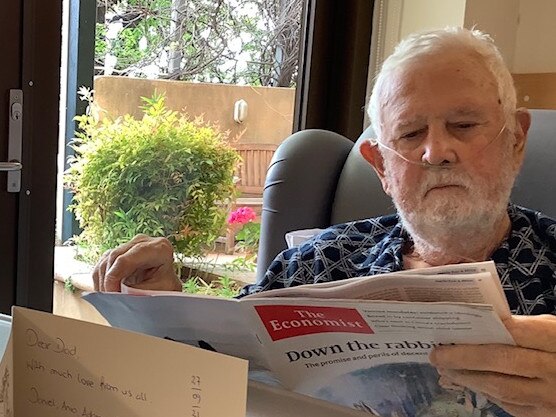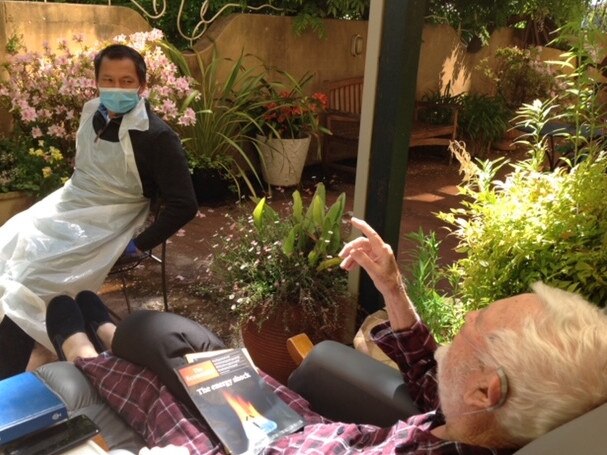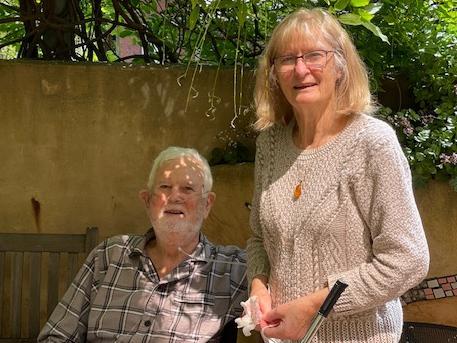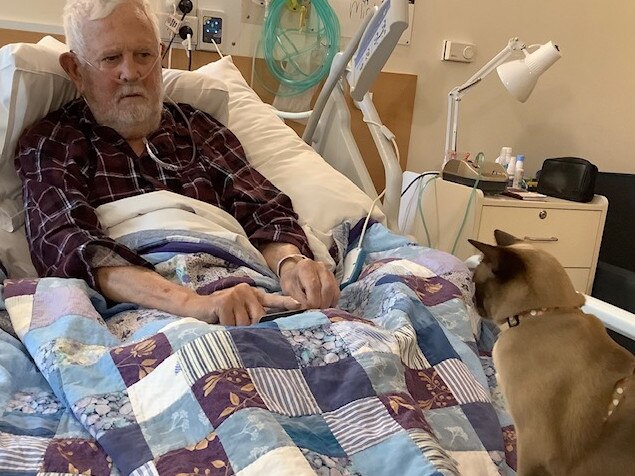Patient Mike Jenkinson sings the praises of wonderous Whittle Ward
Most patients have only a brief experience with the Whittle Ward, but one man who has had “an unexpectedly long tenure” has been left in awe of one of the state’s “finest W’s”. READ HIS STORY >>
Tasmania
Don't miss out on the headlines from Tasmania. Followed categories will be added to My News.
THE Whittle Ward has been singled out for praise from a patient who has spent more than 100 days there.
Mike Jenkinson, a former Australian rugby player, journalist, bureaucrat and author, has penned a piece on the specialist palliative care unit at the old Repatriation Hospital in Hobart.
He believes it should receive as many accolades as Tasmania’s wine and whisky.
“After an unexpectedly long tenure in a ward that is a brief experience for most patients, I became convinced that most of the team were not only intelligently recruited and well trained for the job – they had been born for it,” Mr Jenkinson writes.
“Tasmanians should rank Whittle among their finest W’s.”
Mr Jenkinson, 81, who was chosen in an Australian rugby team to tour southern Africa in 1963 and worked for newspapers including The Australian, moved to Hobart from Sydney in 1985 and was admitted to the Whittle Ward 108 days ago (on Thursday).
“A pneumonia attack landed me in hospital in August and they found that pulmonary fibrosis had already made my lungs dysfunctional,” he said.
“There were other complications.
“Three months ago they had to give up on a cure and commit me to Whittle.
“Initially it seemed a day or two would see me out here. Who knows what’s ahead?”

Mr Jenkinson worked for several Tasmanian government agencies, including the former Tasmanian Development Authority and Major Projects Tasmania, and travelled overseas with state delegations representing both sides of politics.
He wrote several books, including Tasmania to the Letter, and also was involved in launching Tasmanian lifestyle magazines Leatherwood and 40° South.
He edited an electronic newsletter for Brand Tasmania for 15 years that was circulated to more than 50 countries.
Mr Jenkinson is in awe of the Whittle Ward staff including volunteers.
“As a final view of our world, it’s more than acceptable and shows how Whittle has learned to make a departure feel like an indulgence,” he wrote.
Whittle Ward one of Tassie’s wonderous W words
TASMANIANS use the letter W brilliantly.
Think about wine, whisky ... and the Whittle Ward.
After decades of global accolades, we can be pretty confident the world is well aware of our well-loved tipples.
Recent first-hand experience has convinced me that our Whittle Ward is just as praiseworthy.
It has become a personal concern, now, that the J.W. Whittle Palliative Care Unit didn’t even rate a mention when I wrote Tasmania to the Letter in 2006.
Like most other people I didn’t think too much then about my final days.
Lucky for me – and others like me – the Whittle team was taking up this slack with a truly professional focus on the management of dying.
The ward’s 40-strong nursing team defines palliative care as “the active total care of patients whose disease is not responsive to curative treatment”.
This includes control of pain and other symptoms, as well as “psychological, social, cultural and other spiritual support”.
This grab-bag of human needs is passed around without fuss in the ward as if it belonged to us all equally.

Whittle staff are well-respected in the wider community.
Few Tasmanians have not heard comments like: “They are so good at helping patients find some comfort in a situation they haven’t had to face before.”
“They are trained for it and it’s obviously what they want to do.”
After an unexpectedly long tenure in a ward that is a brief experience for most patients, I became convinced that most of the team were not only intelligently recruited and well trained for the job – they had been born for it.
Several of the nurses who looked after me explained how palliative care had drawn them from other streams of hospital work.
“I started with a focus on neonatal nursing, but I found palliative care so rewarding emotionally that I’d be happy to work here for the rest of my career,” one said.
Another said: “Palliative care won me over. Once I was here this is where I wanted to work.”
There are usually between three and five nurses on duty at any one time and they are backed are up by hospital assistants, orderlies and technicians with various capabilities.
Cleaning, of course, is a non-stop process.
Volunteers, many with musical or other expertise, look for opportunities to help, entertain or distract.
Some of the team have worked there for 20 years or more.
Careers have started in some far-flung places, as well as many corners of Tasmania.
The unexpected twists they have taken can provide hours of conversational entertainment.

This diverse team has shown skills recently that extend well beyond medicine when visitors needed help to safely negotiate the Covid maze in order to personally farewell dying loved ones.
This was important for me.
Whittle also made it possible for my wife Libby to sleep beside me on a fold-out bed, ending her night-time anxiety about my state of health.
After weeks alone in hospital beds, I felt positively pampered.
(Furry visitors are also allowed. I have enjoyed calls from a Burmese cat that does card tricks).
Physically, Whittle occupies the lower levels of the Repatriation Hospital, which was built off Davey Street in the 1970s.
It is not a sandstone Hobart classic nor an ultra-modern attention grabber, but it has a quiet appeal that fits its mission.
Lawns and trees separate it from the traffic and provide a flourish of civic style.
Inside, the reduced need for patient monitoring in the final stage of care has enabled the clamour of a modern hospital to be toned down.
Tranquillity and uninterrupted sleep are a magical concoction.

Whittle’s simple interiors add to a mood of relaxation and homeliness. Many of the bed quilts, floral tablecloths and other items have been donated by volunteers.
Each of the ward’s 10 rooms is spacious and shares a large bathroom with its nearest neighbour.
A double glass door facing north opens on to a courtyard that flanks the building and is decorated with pot plants and sculptures.
Outside room 7, freshly green oak leaves are shading a scene of spring exuberance.
There was a wisteria – it’s colour faded now – a pink azalea, a yellow snapdragon and a potted lemon, among other delights.
As a final view of our world, it’s more than acceptable and shows how Whittle has learned to make a departure feel like an indulgence.
Tasmanians should rank Whittle among their finest W’s.
Mike Jenkinson is a former newspaper journalist and an obsessive writer




